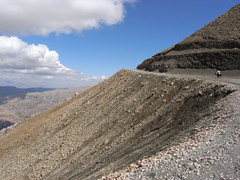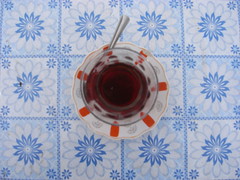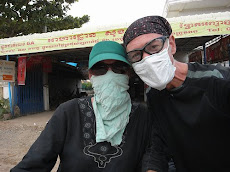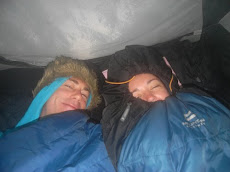We had no desire to repeat the ordeal we'd had cycling into Istanbul so we took a ferry boat up the Bosphorous towards the Black Sea and the NE suburbs of the city. It was in itself a great journey with dolphins and shearwaters in the channel as we passed under two huge suspension bridges that connect Europe to Asia, as well as ruined castles and the beautiful seafront homes of the rich. By contrast to our journey in, on the way out (armed wıth our newly purchased Turkey Road Map) we left on hilly country roads and were suprised to find small rural (and conservatively muslim) villages almost as soon as we left the city.

We were headed for the Black Sea coast where we planned to give ourselves a rest and a beach holiday. Instead what we found was some of the most strenuous and demoralising cyclıng of the trip so far - steeply up and down valleys wıthout even a pause for breath at the top - knackering.
There were beaches and campsites and the area was (as yet) not ruined by mass tourism but the market was for less affluent Turks and we failed to find a place we really liked that had clean toilets/showers, shade for the tent and a clean beach for a tenner a night - which didn't seem too much to ask for? So we cycled along the coast in search of a holiday, camping on beaches and cooling off ın the sea alongside fully clothed women and sweating up and down hills past Turks harvesting hazelnuts. After 100 miles we admitted defeat and still feeling jaded headed inland towards Ankara.

We set off at dawn to beat the heat and had a great 60 mile ride through the hills, finishing the day at a thermal spa - which was one of those fantastic moments in life when you get just what you really want at exactly the moment you most need it - the hot soak was bliss.

We were then faced wıth the most significant mountain range since the Alps, but compared to the coast we enjoyed cycling higher and higher wıth fantastic views, changing scenery and small villages - though the stench from the battery chicken farms that the area is famous for was hardly fresh mountain air! In Mudurnu we treated ourselves to a night in a restored Ottoman house (now functioning as a hotel), so restored to character that the toilet is still in a cupboard in the room! There has been an Ottoman revıval goıng on ın Turkey with old buildings being restored as hotels, restaurants, museums, etc or simply as houses. Partly as a tourist draw but also as a heritage movement - some of the buildings are fantastıc and in places such as Mudurnu and Beypazari (which we passed through a few days later) there are so many Ottoman buildings that the towns have a real character - in contrast to the modern brightly painted houses and apartment blocks that have shot up in such huge numbers in nearly every town across the country in the past 25 years.

We camped one night at 1200masl at the top of a mountain pass with amazing views. When we sped down the other side we were completely wowed. The landscape opened up before us wıth huge vistas over mountainous desert-like scenery with rocks of red, grey, yellow and green - reminiscent of SW USA - it was quite wild and amazing. As we broke camp one morning vultures circled and we were visited by 3 Turkish sheep dogs - which are about as big and scary as lions and their man-trap like wolf collars only adds to the effect - though they were as soft as lambs with us, as if to prove a point they charged off for a proper dog fight with the pack in the valley below. We had definitely left Europe!

After a weeks cycling we reached Ankara but our Iran visa had still not come through. We paused long enough to eat baked potatoes and marvel at uncovered women in what is Turkey's most secular and modern city but then pressed on to Cappadocia, 200 miles to the south-east. We cycled into a village one morning to get a drink and supplies and were bemused to find there was no tea to be had and therefore lots of old men sitting around with nothing to do. It was explained to us that the fasting month of Ramadam had begun - pants!! Not only was it awkward to eat/drink during daylight hours but everytime we slept anywhere near a mosque then not only were we woken by the dawn call to prayer but also by tuneless banging of drums at 4am to raise people so they could eat before sunrise.
Three days out of Ankara we were hit by our second and more debilitating bout of 'Turkish Tummy'. Tracey exploded from both orifices in spectacular fashion but recovered quickly. I was slow to catch on and cycled for two days at a slow pace in searing heat feeling dreadful. On the edge of Cappadocia we stopped late one evening to explore some troglodyte dwellings in a rockface. It was such a magical spot that we decided to re-occupy a cave house for the night. Apart from thoughts of what might crawl/scurry in during the night and whether I might poo in my sleeping bag it was one of the highlights of the trip so far.

Cappadocia is a fantastic place with a Star Wars landscape and we found the holiday we had been searching for - a lovely campsite with great views, swimming pool, excellent toilets and hot water for a tenner a night! But the real pleasure was that every other lunatic making a long distance journey by bicycle/motorbike also stopped in there and we had a great time sharing drinks, stories and laughs with other travellers from around the world.

After a week our Iranian visas were confirmed so we took a bus back to Ankara to collect them (a journey of 5 hours rather than the 5 days by bike). This took a couple of days and involved Tracey being photographed with a headscarf on. Visas in hand we bused back to the bicycles and gear that we had stored in Cappadocia.

From there we headed out into the wilds of eastern Turkey. The landscape was stunning and otherwordly - volcanic peaks 4km high falling steeply to flat treeless plains and salt lakes. The vıews were vast and the mountain climbs brutal. We granny geared up to a pass and at 1700masl the strain 'popped' Tracey's knee - we're not sure what 'popped' but she was in pain - so we made camp at nearly 2km high where it was very cold and we suffered mild effects of altitude. In the morning clouds and golden eagles drifted past the tent in the mountain silence and we seemed to be a long way from anywhere.

Tracey's knee recovered enough for us to cycle slowly over the pass before a tremendous downhill that took us past villages where houses were made of mud, rock and wood, cow dung was used as fuel (could this be the answer to the oil shortage?) and donkeys were beasts of burden. We stopped in the village of Ganbeyli for supplies and the men were all wearing traditional trousers (baggy crotch and legs tight from the knee down) and a variety of hat styles. One old man gave me his rosary beads in exchange for a look through my binoculars - something he may still be regretting as he pointed them straight at the sun!
Our route was taking us up over high passes and down into valleys on quiet mountain roads. We rarely dropped below 1km asl and the weather closed in on us. At times it was a cold, open, bleak and intimidating landscape and there was hardly a woman to be seen in the towns and villages where we stopped for supplies. Groups of children ran after us like we were pied pipers, shouting 'heylo, heylo'. As we approached the regional centre of Malatya and some civilisation we realised we had not sat in a chair for a week - our backs were killing us and our joints ached.

Typically, on our day off in Malatya the sky had been cloudless but halfway through the following day, as we started a dismaying ascent of a never ending mountain it started to rain - we took shelter under our tarpaulin and a succession of kindly truck drivers offered to take us and our bikes over the mountain - what possessed us to decline these offers I will never know. Several hours later, as it was getting dark we found ourselves at a pass of 1900m asl in the clouds, wet and cold and the road deserted due to Ramadam. We descended until it was dark and pitched the tent on a slither of flat mud near the road. When we departed next morning we found ourselves cycling above the clouds in the valley below.

We slogged our way up mountain roads in the rain heading further into the hills. As we sped down a valley we found ourselves in the centre of a huge storm with crashing thunder, lightening and torrential rain. Soaked and freezing cold we found refuge as the only guests at a restaurant/hostel with intermittent electricity next to a crashing mountain stream. Next day the storm had cleared and we committed cycle touring suicide by pedalling (mainly pushing on my part) to the top of Mount Nemrut at 2,200m asl and the location of the famous statues and burial mound of King Antiochus I Epiphanes, dated to 38BC. It took us 5 hours to travel 8 miles - it was a folly nearly as mad as the ancient kings statues and we would have been broken mentally and physically had we not been totally overawed by the views from the top and the discovery that we could get the bikes past the summit and get down on a road on the other side rather than going back the way we had come. The biggest blow was the discovery that Tracey had somehow lost her only pair of trousers on the way up - there was no way we were going back for them!

We wore out a set of brake pads on the way down and then crossed the Euphrates River by ferry into ancient Mesopotamia (a place that sounds more exotic than it is) where the land was covered by rocks as far as the eye could see. We had entered the kurdish area of Turkey and things got instantly rougher and poorer. After a nights rain we pedalled into the town of Siverek. Rubbish was dumped in the muddy streets, a girl was putting cow dung fuel bricks out to dry, the shops were shuttered, people were dressed in their best clothes and on the move and gangs of boys were running around with replica pellet guns shooting anything that moved, ie us!! The final day of Ramadam and start of Şeker Bayrami and the tradition of 'trick or treat' giving of sweets had warped into armed hold-ups for money. It was like being in a war zone - we got supplies and legged it to a real war zone - Diyabakir, the kurdish centre of Turkey.

You will probably be aware of the kurdish separatist movement and ongoing terrorist activity in Turkey. The Turkish army is currently bombing kurdish terrorists in northern Iraq and the bombings in Istanbul earlier in the summer were carried out by the kurds. So it wasn't a suprise to see police patrolling in armoured vehicles with guns pointing out the top. The shops were closed and the people in happy holiday mode. (A week after we left a Kurdish terrorist opened fire on a police bus in Diyarbakır killing several and wounding many more).
Whether it was the warnings we had been given, the exposed landscape, the near absence of women or the Jandarma (army type police) stations bristling with guns and tanks but we didn't feel safe as we headed north-east, climbing up to Lake Van. The first night out of Dıyabakir we found ourselves in the dark with no safe place to pitch the tent, so we knocked on the door of the nearest farm house to ask if we could camp in their grounds. To our amazement/amusement (and theirs) a couple of Italian cycle tourists had done exactly the same thing sometime before us! We were shown fantastic kurdish hospitality and fed home made buffalo yogurt and tea.
A couple of nights later we found ourselves in a mountain gorge as night approached. We stopped in a small village to ask if we could camp on any available flat land and were told we would have to ask the Jandarma, based around the corner. Swarming with armed soldiers they told us that it was not safe for us to camp there or anywhere in the valley due to the risk of us getting shot either by terrorists or the Jandarma patrols mistaking us for terrorists - they also told us it was not safe for us to be on the road after dark and advised us to go to a hotel in Bitlis, 15 miles away uphill. We explained this would take 3 hours and it would be dark in 20 minutes - they advised us to find a bus or truck and put the bikes on it. We had not been refusing free offers of lifts for the past 1000 miles to give in now. So assuming the army to be brainwashed into thinking every Kurd was a terrorist we placed our faith in the goodness of the local populace and cycled off. It was dark by the time we reached the next village, perched up on the mountainside. As we pushed our bikes up the rough dirt track in the blackness it did occur to us that we could be about to knock on the door of Kurdish terrorists and hand ourselves over to kidnappers. So it was with much relief that the house we called on was mainly female and after some shouting amongst themselves we were taken to another house and given a floor to sleep on and once again shown fantastic hospitality. Though a good nights sleep was ruined by Tracey laying stiff as a board worrying that gunmen would arrive and kidnap us.

After cycling uphill for a day and a half we crested the pass and sped down to beautiful Lake Van at 1700m asl. The next day we had a Michael Palin type of adventure and crossed the lake by the ferry, which carries train carriages (bound for Iran) - we were the only passengers and after a 4 hour delay were greeted by the captain, shown the engine room by crazily mustachioed mechanics and fed food and tea. After all the hard graft by bicycle it was such a joy to spend 5 hours crossing the lake and marvelling at the stunning scenery of snow capped mountains. We docked in Van, a friendly city where we rested our aching joınts, explored the spectacular remains of the castle and prepared for Iran.


The 3 day 110 mile ride from Van to Dogubayazit was not without incident. After a nice days ride taking in more mountains and the eastern side of Lake Van we asked a local family if we could camp in their garden - whereupon it seemed like half the villages children turned up to watch us pitch the tent and cook - have you ever chopped an onion with an audience? They gave us a big blanket and cushions for the cold, which we needed as it was barely above freezing during the night. The next morning we paused at a waterfall picnic site before climbing up into some impressive mountain scenery with kurds living a mainly pastoral existence. We kept going up and it got very cold as late afternoon approached (it is dark here at 5.45pm due to Turkey operating on one time zone) - we made the sensible decision for once and opted to ask if we could camp in a village rather than attempt to make the summit before nightfall. We were really grateful that the family we asked invited us to sleep in their home as it was bitterly cold. The family was huge (40 people living in three houses!) and fantastic at making us welcome and feeding us and the women even gave Tracey two headscarves when we left, though the bed bugs were less welcome!

The next morning we reached the highest point on our trip so far, 2644 metres above sea level. As we descended it was sunny and very cold with spectacular views of kurdish mountain villages and the snowcapped 5km high Mount Ararat (reputedly the resting place of Noah's Ark after the flood). It was all going swimmingly as we descended towards Dogubayazit. As we approached a village, as usual a gang of young boys spotted us and ran to the road to have a look/beg, unfortunately one of them tried to snatch a ribbon from Tracey's bike as she passed which just pulled her handlebars and threw her from her bike. She fell heavily on her knees in some pain. Soon we were surrounded by local women offering to try and patch her up while the little imp responsible ran for the hills before I could give him a good beating. After some commotion and a bandage Tracey got back on her bike and we limped slowly into town. Her knee has swollen and we are stuck in this border town 20 miles from Iran and over a mile above sea level until her leg is well enough to cycle again.






















 Cappadocia is a fantastic place with a Star Wars landscape and we found the holiday we had been searching for - a lovely campsite with great views, swimming pool, excellent toilets and hot water for a tenner a night! But the real pleasure was that every other lunatic making a long distance journey by bicycle/motorbike also stopped in there and we had a great time sharing drinks, stories and laughs with other travellers from around the world.
Cappadocia is a fantastic place with a Star Wars landscape and we found the holiday we had been searching for - a lovely campsite with great views, swimming pool, excellent toilets and hot water for a tenner a night! But the real pleasure was that every other lunatic making a long distance journey by bicycle/motorbike also stopped in there and we had a great time sharing drinks, stories and laughs with other travellers from around the world.

 Tracey's knee recovered enough for us to cycle slowly over the pass before a tremendous downhill that took us past villages where houses were made of mud, rock and wood, cow dung was used as fuel (could this be the answer to the oil shortage?) and donkeys were beasts of burden. We stopped in the village of Ganbeyli for supplies and the men were all wearing traditional trousers (baggy crotch and legs tight from the knee down) and a variety of hat styles. One old man gave me his rosary beads in exchange for a look through my binoculars - something he may still be regretting as he pointed them straight at the sun!
Tracey's knee recovered enough for us to cycle slowly over the pass before a tremendous downhill that took us past villages where houses were made of mud, rock and wood, cow dung was used as fuel (could this be the answer to the oil shortage?) and donkeys were beasts of burden. We stopped in the village of Ganbeyli for supplies and the men were all wearing traditional trousers (baggy crotch and legs tight from the knee down) and a variety of hat styles. One old man gave me his rosary beads in exchange for a look through my binoculars - something he may still be regretting as he pointed them straight at the sun!


































